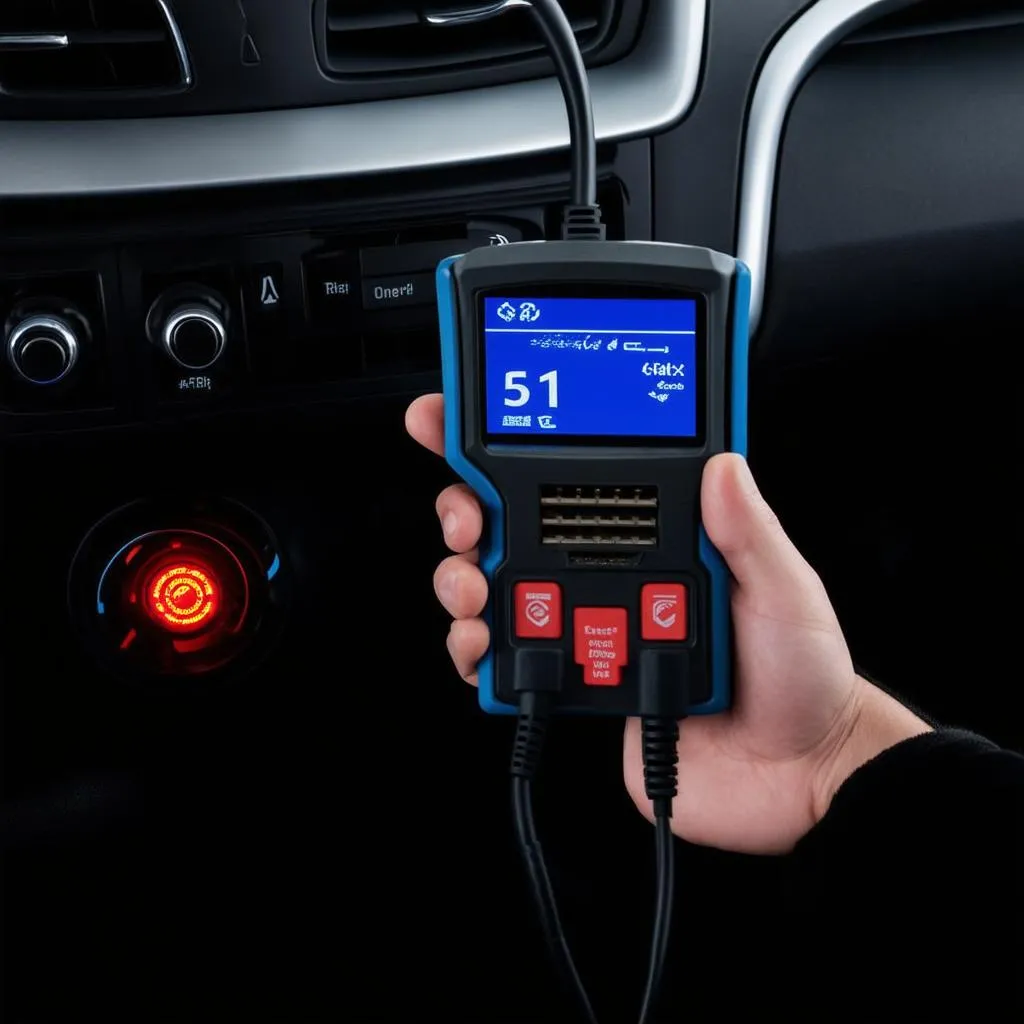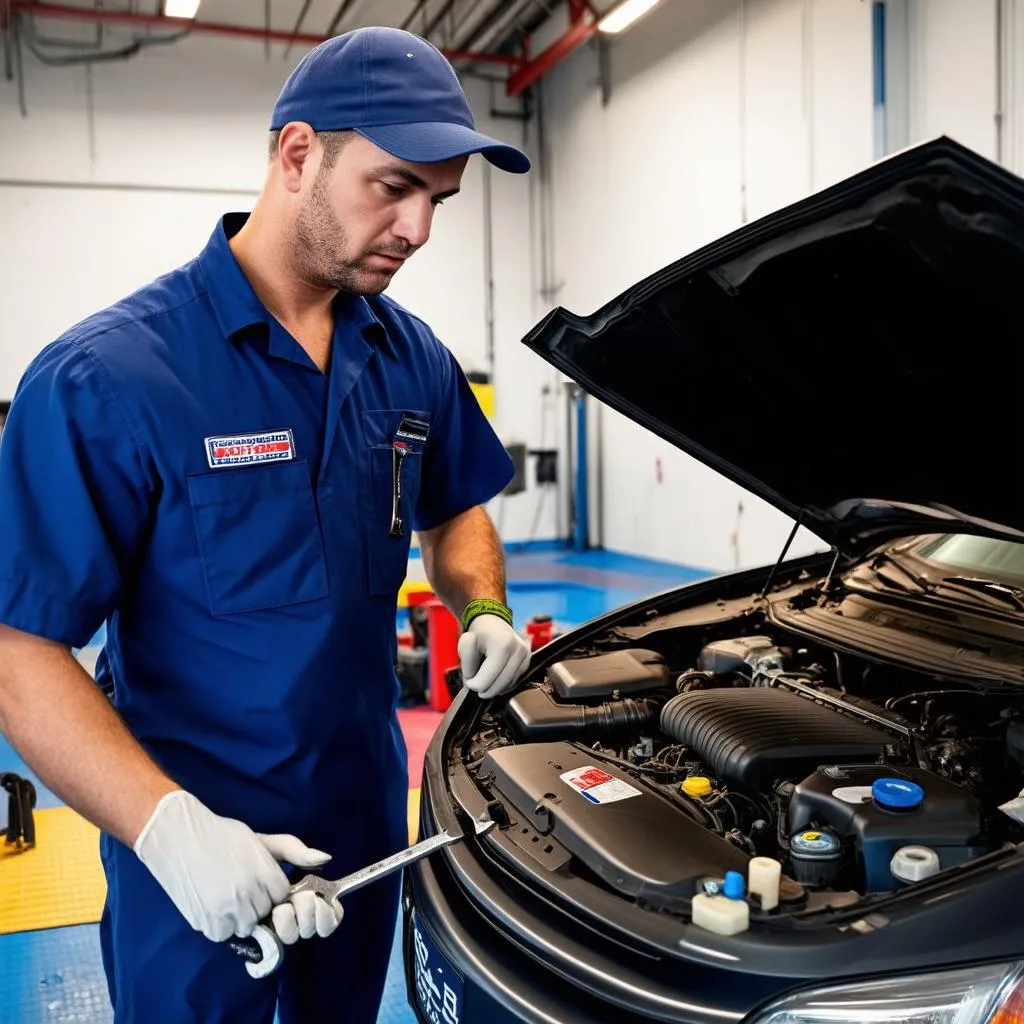Have you ever been cruising down the road, enjoying a smooth ride, when suddenly your check engine light throws a wrench into your plans? Don’t panic! While a glowing dashboard light can be unsettling, it doesn’t always spell disaster. One common culprit, especially in modern European cars, is the OBD code P0191. This cryptic code might seem like a foreign language, but it’s actually your car trying to tell you something important about its fuel system, specifically the fuel rail pressure sensor.
What Exactly Does OBD Code P0191 Mean?
In essence, the P0191 code signals a problem with your car’s fuel rail pressure sensor circuit. This sensor is a critical component that monitors the pressure of the fuel being delivered to your engine. Think of it as the quality control manager of your car’s fuel system, ensuring the engine receives the right amount of fuel for optimal performance. When this sensor sends faulty signals or readings that fall outside the expected range, your car’s computer (the Engine Control Unit or ECU) throws up the P0191 code.
But what does this mean in practical terms? Let’s break it down:
Understanding the Fuel Rail Pressure Sensor’s Role
Imagine your car’s engine as a finely tuned machine, much like a high-performance athlete. Just as an athlete needs the right balance of nutrients for peak performance, your engine needs the perfect air-fuel mixture. This is where the fuel rail pressure sensor comes in. It measures the pressure of the fuel in the fuel rail (the pathway that delivers fuel to the injectors) and relays this information to the ECU. The ECU uses this data to adjust the amount of fuel injected into the engine, ensuring a smooth, powerful, and efficient ride.
Causes of OBD Code P0191
Now that we understand the sensor’s crucial role, let’s look at what can cause it to send erroneous signals, triggering the dreaded P0191 code:
- Faulty Fuel Rail Pressure Sensor: Like any electronic component, the sensor itself can wear out or fail over time.
- Wiring Problems: Damaged, corroded, or loose wiring in the sensor circuit can disrupt the signal flow.
- Fuel Pump Issues: A failing fuel pump might not be able to provide adequate fuel pressure.
- Clogged Fuel Filter: A restricted fuel filter can impede fuel flow and affect pressure readings.
- Fuel Leaks: Leaks in the fuel system can lead to pressure loss.
Symptoms Associated with P0191
Ignoring a P0191 code can impact your car’s performance and fuel efficiency. Here are some common symptoms you might experience:
- Check Engine Light: This is often the first and most obvious sign.
- Rough Engine Idle: Your car might vibrate noticeably while idling.
- Hesitation or Stalling: You might feel the engine hesitate or even stall during acceleration.
- Reduced Fuel Economy: A malfunctioning fuel system can lead to decreased mileage.
- Increased Emissions: An improper air-fuel mixture can result in higher emissions.
How to Approach a P0191 Code
If you’re facing a P0191 code, don’t despair. Here’s a systematic approach:
- Read the Code: Use an OBD-II scanner to confirm the P0191 code.
- Research and Consult: Gather information about the code and possible causes. Consulting a trusted mechanic, especially one specializing in your car’s make and model, is highly recommended.
- Check the Basics: Start with simple checks like inspecting the fuel cap for a tight seal and examining the fuel rail pressure sensor’s wiring for any visible damage.
- Diagnose and Repair: Based on your research and/or a mechanic’s diagnosis, address the root cause. This might involve replacing the sensor, repairing wiring, or addressing issues with the fuel pump, filter, or leaks.
- Clear the Code: After repairs, use the OBD-II scanner to clear the code and ensure the check engine light turns off.
 OBD Scanner Connected to a Car's Diagnostic Port
OBD Scanner Connected to a Car's Diagnostic Port
Beyond the Technical: A Holistic Perspective
While the P0191 code is a technical issue, it’s interesting to consider the broader implications. In many cultures, cars are seen as more than just machines; they represent freedom, progress, and even an extension of our personal space. When a car malfunctions, it can disrupt our routines and even evoke feelings of frustration or vulnerability. Just as we maintain our physical and mental well-being, caring for our cars through regular maintenance and addressing issues promptly ensures they continue to serve us reliably and contribute to our peace of mind.
FAQs About OBD Code P0191
Here are some common questions car owners have about the P0191 code:
- Can I still drive my car with a P0191 code? It’s not advisable to drive for extended periods with this code, as it can lead to further engine problems or reduced fuel efficiency.
- How much does it cost to fix a P0191 code? The cost varies depending on the root cause. Replacing the sensor itself might be relatively inexpensive, while fixing a fuel pump issue can be more costly.
- Is it safe to clear the code myself? While you can clear the code with an OBD-II scanner, it’s essential to address the underlying problem. Simply clearing the code without fixing the issue is like silencing an alarm without addressing the fire.
- Can a bad fuel rail pressure sensor damage my engine? Yes, a malfunctioning sensor can lead to an incorrect air-fuel mixture, potentially causing engine damage over time.
 Mechanic Inspecting a Car Engine
Mechanic Inspecting a Car Engine
Similar OBD Codes and What They Mean
While P0191 focuses on the fuel rail pressure sensor circuit, several other codes relate to fuel system issues:
- P0190: Fuel Rail Pressure Sensor Circuit Malfunction
- P0192: Fuel Rail Pressure Sensor Circuit Low Input
- P0193: Fuel Rail Pressure Sensor Circuit High Input
- P0194: Fuel Rail Pressure Sensor Circuit Intermittent
Each code provides more specific information about the nature of the problem, aiding in accurate diagnosis and repair.
Popular European Car Brands We Support
At Techcarusa.com, we understand the intricacies of European vehicles. Our expertise extends to a wide range of makes and models, including:
- Audi
- BMW
- Mercedes-Benz
- Volkswagen
- Porsche
- Volvo
Need Expert Assistance? We’re Here to Help!
Dealing with car troubles can be stressful. If you’re struggling with a P0191 code or any other automotive issue, don’t hesitate to reach out. Our team of expert technicians is available 24/7 to provide guidance and support. Contact us via WhatsApp at +84767531508 for immediate assistance with diagnostic tools, software installation, or any car repair needs. We’re dedicated to getting you back on the road safely and smoothly!
Keep Exploring the World of Car Care
Understanding your car’s language is key to a long and happy relationship. Explore our website, techcarusa.com, for a wealth of information on car maintenance, troubleshooting, and expert advice. Remember, a little knowledge goes a long way in preventing small issues from becoming major headaches.